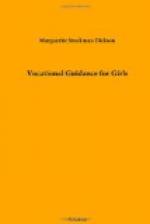It is not true of course that every girl of moderate means, or without means, who marries a man of wealth does so because of his money. Nor is it always true when the cases are reversed. Love may be as real between those two as between any others. But when it is true that the marriage is an exchange of commodities, it is no different from prostitution under other circumstances. In fact, it is prostitution under cover, without acceptance of the stigma which for centuries has been the portion of voluntary selling of the body to him who cares to buy.
[Illustration: Copyright by Underwood & Underwood JULIA WARD HOWE AND HER GRANDDAUGHTER In the life of Mrs. Howe was exemplified the identity of ideals of husband and wife. They worked side by side in the literary field and in their philanthropic and reform work]
Eugenics, a modern science which aims at race regeneration, lays down many laws and restrictions for those who are selecting their mates. By the following of these laws and restrictions in the selection of husbands and wives, undesirable traits in the offspring are to be weeded out and desirable; ones are to be fostered and increased. That these laws should be studied with the care used by breeders of plants and animals goes without saying. That if they are followed strictly the number of marriages would be materially reduced, at least for a considerable time, is doubtless true. That marriages in which eugenics has played the major part in selection will present new problems is probably equally true. If marriages were mere temporary unions, for the purpose of obtaining offspring, eugenic principles could not be too exactly nor too coldly applied to the selection of mates. But since marriage implies living together and becoming, or continuing to be, worthy members of the community, and since the offspring are fashioned no less by the conditions of their upbringing than by heredity, selection of mates must involve more than looking for eugenically perfect fathers and mothers for the generations yet unborn. Eugenics, however, is in infancy as a science, and, like the human infants it would protect, must react to the environment in which it finds itself and must feel the chastening hand of time before its value can be known. Agitation in the direction of allowing posterity to be “well born” can never be out of place. What being well born is and how it shall be attained is a worthy subject of research. As a cold, exact science, however, eugenics can never hope for application without some consideration of the personal equation which makes marriage at its best not a mating merely, but a joining of souls.
Choosing a husband or a wife is, after all, merely the beginning of the marriage problem. Good husbands are not discovered, but made, from originally good or perhaps indifferent or in rare cases from even poor material, by the reaction of married life upon what was previously mere “man.” Even so with wives.




